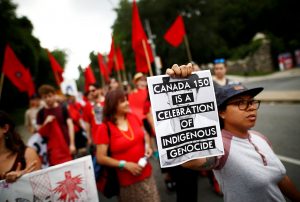Hello! Welcome to my blog, and welcome to English 372. I’m excited to participate in this online space and examine alongside my peers and professor the changing landscape of Canadian literature, scrutinizing the complexities of storytelling with a particular focus on the relationship between the Canadian nation-state and the First Nations on whose stolen land we now live, work and study.
We have been gifted a varied and illuminating set of course materials through which we will garner a greater understanding of the intricacies of Canadian storytelling. I expect to scrutinize the authorial voices of the texts – how we can examine, for example, the differences in perspective and intent between the scholarly works of Lee Maracle, a member of the Sto:Loh nation, and those of non-Indigenous authors such as Michael Asch, whose examination of Canadian sovereignty and history arrives through an anthropological settler lens (as far as I can tell). It is my duty, as a non-Indigenous scholar of Canadian and First Nations literature, to understand these issues of perspective, authenticity, and the potentially voyeuristic, or “touristic,” gaze of a non-Indigenous person’s examination of First Nations history, storytelling, and culture.
I am interested in examining throughout this course the question of what it means to be Canadian. I found an article by Reader’s Digest Canada presenting five famous Canadians’ answers to this difficult question, with the running theme being that of the supposed compassion and friendliness of our country; and yet I noticed that no Indigenous voices were interviewed here, and it led me to wonder how an Indigenous individual might have answered such a question. Would they have focussed so exclusively on Canada’s supposed fantastic kindness? Perhaps not.

Fig. 1. Maclean’s. “An indigenous rights activist holds a sign reading ‘Canada 150 is a Celebration of Indigenous Genocide’, after the ‘Unsettle Canada Day 150 Picnic’, as the country marks its 150th anniversary with ‘Canada 150’ celebrations, in Toronto, Ontario, Canada July 1, 2017.” Maclean’s, 2 July 2017, https://www.macleans.ca/multimedia/photo/scenes-from-canada-150-a-national-celebration-of-canadas-birthday/image/9/#gallery/canada-day-in-photos/slide-9. Accessed 14 January 2021.
Another example of this image of a supposedly morally superior and generous Canada is the famous “I Am Canadian” advertisement, a work so brazenly patriotic, so unashamed in its love for the Canadian’s supposed belief “in peacekeeping, not policing” and “diversity, not assimilation,” that in many ways it is mere propaganda. Yet as we saw two summers ago in the wake of the Wet’suwet’en’s protesting of pipelines, and as Thomas King tells us in his recent book “The Inconvenient Indian,” we are a nation of policing and assimilation – if only against our First Nations.
In a recent interview with CBC Books, Thomas King spoke of how he believed “we would have gotten past the intolerance of racism by now” (King); his “Canadian-ness” is not the same as Dan Akroyd’s or Donald Sutherland’s, two of the celebrity voices featured in the Reader’s Digest article. So the question remains: what – or who – is Canada?
Works Cited
“5 Famous Canadians Share What It Means to Be Canadian.” Reader’s Digest Canada, 24 June 2019, https://www.readersdigest.ca/travel/canada/being-canadian-meaning/. Accessed 14 January 2021.
Hernandez, Jon. “Reports of RCMP snipers dispatched to Wet’suwet’en blockade ‘concerning,’ says Indigenous Services minister.” CBC, 20 December 2019, https://www.cbc.ca/news/canada/british-columbia/rcmp-snipers-first-nation-pipeline-protest-guardian-1.5405111. Accessed 14 January 2021.
Maracle, Lee. “Lee Maracle.” Strong Nations, https://www.strongnations.com/gs/show.php? gs=3&gsd=1065. Accessed 14 January 2021.
Molson Canadian. “I Am Canadian.” YouTube, uploaded by Vinko, 22 May 2006, https://www.youtube.com/watch/BRI-A3vakVg. Accessed 14 January 2021.
Patrick, Ryan B. “Thomas King is hopeful that his writing has changed the world – but he’s still not sure.” CBC, 10 November 2020, https://www.cbc.ca/books/thomas-king-is-hopeful-that-his-writing-has-changed-the-world-but-he-s-still-not-sure-1.5795015. Accessed 14 January 2021.
“The story behind the story: Thomas King on The Inconvenient Indian.” National Post, 15 October 2013, https://nationalpost.com/entertainment/books/the-story-behind-the-story-thomas-king-on-the-inconvenient-indian. Accessed 14 January 2021.